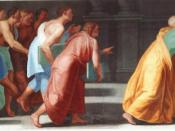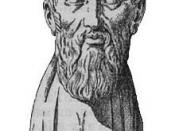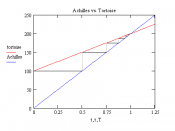History of Math
Zeno of Elea
Zeno of Elea is a Greek mathematician. He would, however, be better described as a
philosopher. Little is known about his life for none of his own writings have survived. Most of
what is known about him comes from the writings of Aristotle. Zeno is said to have lived during
the fifth century BC in the Greek town of Elea in southern Italy. Zeno is important to the study of
Math History because of his major contributions, the paradoxes, and some other minor
contributions.
The most noted of Zeno's works are his paradoxes. Those dealing with plurality and with
motion. These were written in response to a theory circulating through the region concerning what
we today would call a timespace continuum. The other Greek philosophers and mathematicians
thought that the world was a plurality of points and instants.1 This theory was started by the
Pathagoreans. They said the world had continuity. To contradict them, Zeno took their arguments
for continuity to an extreme at which point they became absurd.
To argue against plurality, Zeno said that if they are a continuous number of points then
there is a given number of them. Yet, if they are finite, they cannot be infinite and plural. The
whole point of his argument is to bring his opponents argument to a contradiction of logic. This
was a typical argument against plurality.
Similar to Zeno's argument against plurality is his argument against motion. He did not
truly believe that motion, as given by the senses, exists. These paradoxes built around the
argument of an infinite being finite make up the majority of his world view.
The first paradox of motion is called the Dichotomy. It basically says that for an object to
travel a given distance, it must first...


